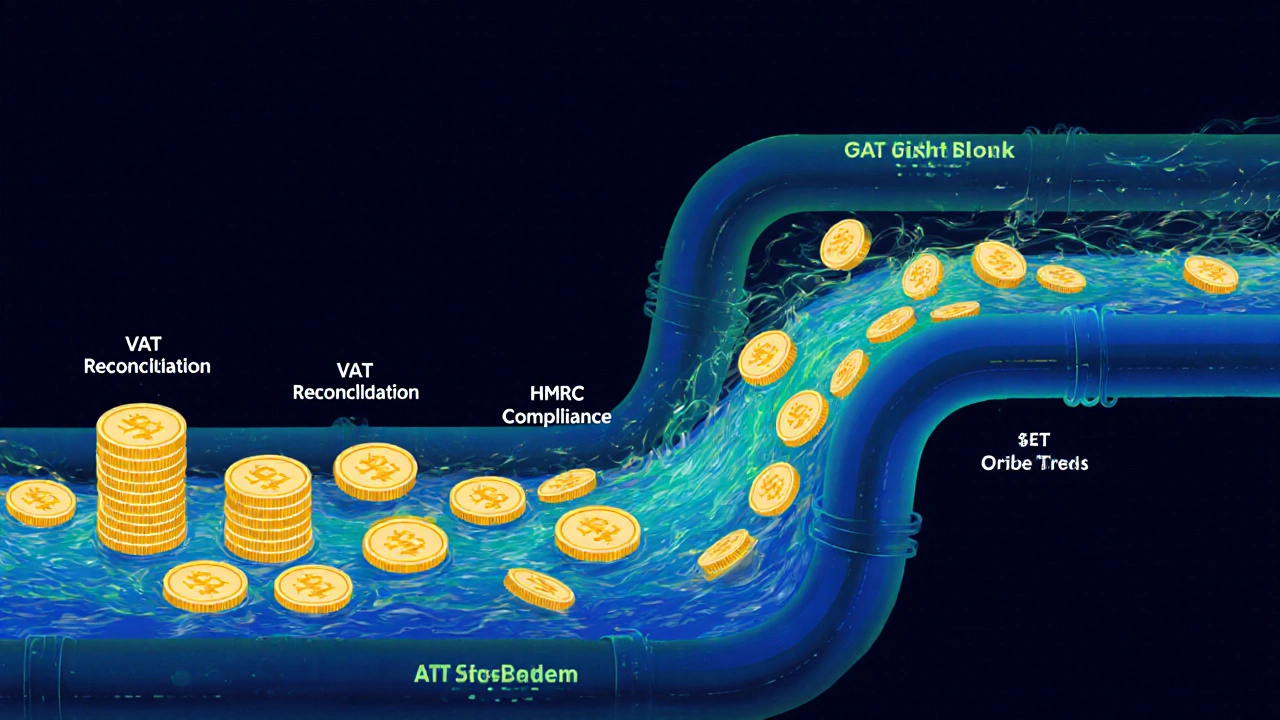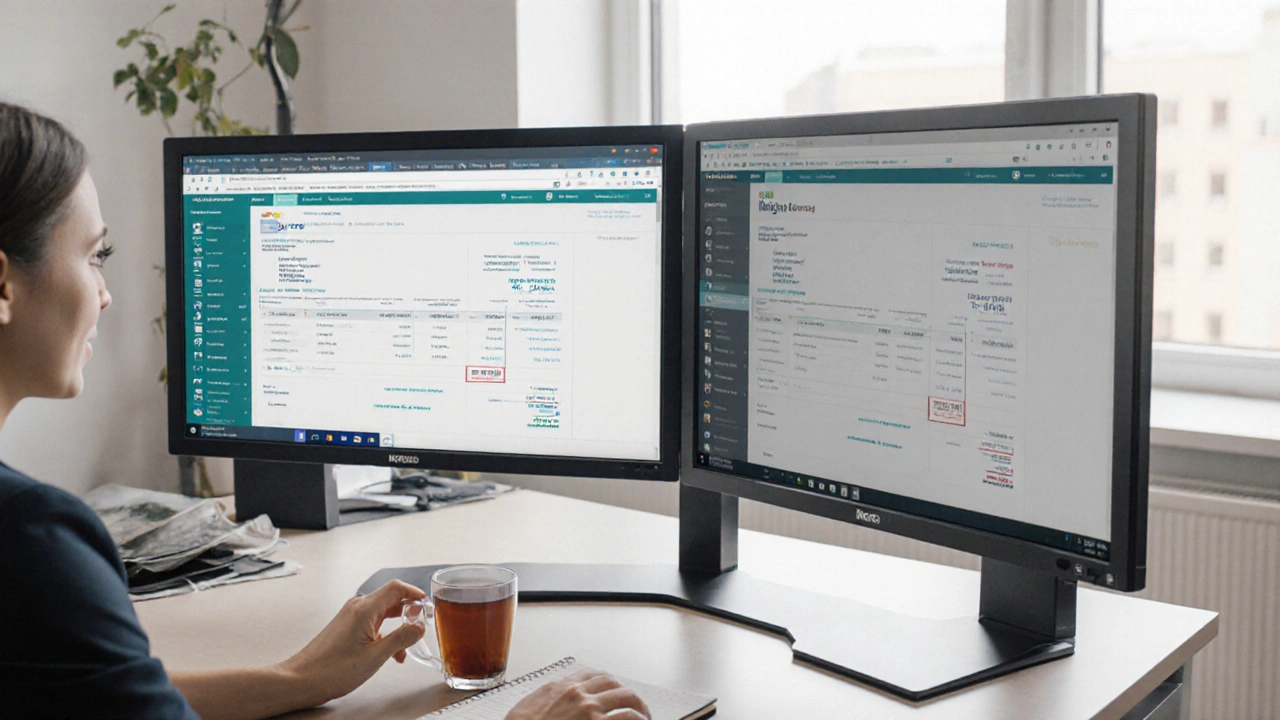Accounts Payable in the UK: Managing Supplier Payments Effectively
21 Nov, 2025Managing accounts payable in the UK isn’t just about writing checks or clicking ‘pay’ in your software. It’s about keeping cash flowing, avoiding late fees, maintaining supplier trust, and staying compliant with HMRC rules. If you’re running a business here, whether you’re a small shop or a growing mid-sized firm, getting your AP game right means fewer headaches and more room to grow.
What Exactly Is Accounts Payable in the UK?
Accounts payable (AP) is the money your business owes to suppliers for goods or services already received but not yet paid for. In the UK, this includes everything from office supplies and raw materials to software subscriptions and logistics services. Unlike some countries where payments are mostly cash-on-delivery, UK businesses operate on credit terms - often 30, 60, or even 90 days net. That gives you breathing room, but it also means you need a system to track what’s due, when, and to whom.
Every invoice you receive gets logged into your AP ledger. That’s not just a spreadsheet anymore - modern UK businesses use cloud-based accounting tools like QuickBooks Online, Xero, or Sage Business Cloud. These platforms auto-match invoices to purchase orders and delivery notes, flagging mismatches before payment. This cuts down on errors and fraud, which is especially important given the rise in invoice fraud targeting UK SMEs.
Why Poor AP Management Costs You Money
Think you’re saving money by delaying payments? Think again. Late payments hurt more than you realize.
- Suppliers charge late fees - often 5% to 10% per month in the UK, even if not written in the contract.
- Some suppliers cut you off entirely. One London-based manufacturer told us they stopped supplying a client after three late payments - even though the client was worth £120k a year.
- Bad payment history damages your credit score with agencies like Experian Business and Equifax. That makes it harder to get loans or overdrafts later.
- HMRC can penalize you if you’re late paying VAT on supplier invoices. Even if you haven’t paid the supplier yet, you still owe VAT to the government on the date the invoice was issued.
One Bristol-based retailer was hit with a £7,200 penalty in 2024 because they didn’t reconcile their AP records with their VAT returns. They thought they were just late paying the supplier - they didn’t realize HMRC didn’t care about their payment schedule.
How the UK AP Process Works (Step by Step)
Here’s how a clean, efficient AP workflow looks in the UK today:
- Receive the invoice - Whether it’s emailed, uploaded via a portal, or sent by post, get it into your system fast. Use tools like Receipt Bank or Dext to scan and extract data automatically.
- Match it - Compare the invoice to your original purchase order and the goods receipt. If you ordered 100 units and got 98, don’t pay for 100.
- Approve it - Set up digital workflows so the right person (your procurement manager, finance lead) approves each invoice. No more chasing signatures on paper.
- Record it - Post the invoice to your accounting system with the correct GL code. Misclassifying an invoice as ‘office expenses’ instead of ‘marketing services’ messes up your budgeting.
- Pay on time - Schedule payments to hit on or before the due date. Use BACS for direct bank transfers - it’s free and reliable. Avoid cheques unless you have to.
- Reconcile - Every week, check your bank statement against your AP ledger. Missing one payment can throw off your whole cash flow forecast.
Companies that follow this process pay 22% faster on average, according to a 2024 survey by the Institute of Finance & Management. They also report 40% fewer disputes with suppliers.

Common UK AP Mistakes (And How to Avoid Them)
Even experienced finance teams make these errors:
- Ignoring duplicate invoices - One company paid the same £8,500 invoice twice because the supplier re-sent it after a system glitch. They didn’t catch it until the next audit.
- Not verifying supplier bank details - Fraudsters have hacked supplier email accounts and sent fake invoices with new IBANs. Always confirm changes via phone, not email.
- Waiting until the last minute - If your AP team only processes payments on Fridays, you’ll always be late. Set up recurring payments for fixed costs like rent and utilities.
- Not taking early payment discounts - Many UK suppliers offer 2% off if you pay within 10 days. That’s a 73% annual return on your cash. Why leave that on the table?
- Not reconciling with VAT returns - If you claim input VAT on an invoice but never pay the supplier, HMRC can claw it back. Keep a clear audit trail.
Tools That Make UK AP Easier
You don’t need a big finance team to run smooth AP operations. Here are the tools UK businesses actually use:
| Tool | Best For | UK Features | Cost (Monthly) |
|---|---|---|---|
| Xero | Small to mid-sized firms | Auto-syncs with HMRC for Making Tax Digital VAT | £11-£36 |
| QuickBooks Online | Businesses using US-based suppliers | Multi-currency support for EU imports | £10-£35 |
| Dext | High invoice volume | OCR scans paper invoices, extracts VAT codes | £15-£50 |
| Sage Business Cloud Accounting | Businesses already using Sage payroll | Integrated payroll and AP reporting | £12-£40 |
Most of these tools connect directly to UK bank accounts via Open Banking. That means your payments can be scheduled with one click, and you’ll get real-time updates on payment status.
How to Negotiate Better Payment Terms with UK Suppliers
Don’t just accept the first terms a supplier offers. You can - and should - negotiate.
- Ask for 60-day terms instead of 30. Most suppliers will agree if you’re a steady customer.
- Offer to pay upfront in exchange for a discount. Even 3% off can save you thousands a year.
- Bundle purchases. If you buy from three different suppliers for the same product, combine them into one contract.
- Use payment terms as leverage. If a supplier is slow to deliver, tie payment to delivery confirmation.
One Manchester-based café chain renegotiated terms with their coffee bean supplier after showing 18 months of on-time payments. They went from 30-day terms to 60-day terms - and got a 5% discount for paying within 30. That’s a win-win.

What HMRC Expects from Your AP Records
HMRC doesn’t care how you manage your AP - but they do care that your records are accurate and timely. Under Making Tax Digital (MTD), you must:
- Keep digital records of all supplier invoices and payments
- Submit VAT returns through MTD-compatible software
- Match your AP ledger to your VAT return - every invoice with input VAT must be accounted for
- Retain records for six years
Failure to comply can lead to penalties. In 2024, HMRC issued over 12,000 penalties to small businesses for inaccurate VAT reporting tied to AP errors.
Pro tip: Use your AP system to auto-tag every invoice with its VAT rate (0%, 5%, or 20%). That makes filing VAT returns painless.
When to Outsource Your AP Function
If you’re spending more than 15 hours a week on AP tasks, it’s time to consider outsourcing. Many UK finance service providers offer AP-as-a-service packages for £300-£800/month.
They handle:
- Invoice capture and coding
- Approval workflows
- Payment scheduling
- VAT reconciliation
- Supplier communication
One Nottingham-based e-commerce business saved 20 hours a month and reduced payment errors by 90% after outsourcing. Their accountant now focuses on forecasting, not data entry.
Final Thoughts: AP Isn’t Just a Back-Office Task
Think of your accounts payable team as a strategic partner, not just a bill-payer. When you pay suppliers on time, you build trust. When you negotiate better terms, you free up cash. When you avoid penalties, you protect your bottom line.
Start small: pick one thing to fix this week. Maybe it’s setting up auto-pay for your monthly internet bill. Or maybe it’s checking your last 10 invoices for duplicates. Do that one thing right, and you’ll see the ripple effect.
Good AP isn’t about being perfect. It’s about being consistent. And in the UK, consistency pays.
What’s the standard payment term for suppliers in the UK?
The most common payment term in the UK is Net 30 - meaning payment is due 30 days after the invoice date. However, Net 60 and Net 90 are becoming more common, especially in B2B sectors like manufacturing and wholesale. Some suppliers offer early payment discounts (e.g., 2% off if paid within 10 days). Always check the invoice - terms should be clearly stated.
Can I pay suppliers in euros if I’m based in the UK?
Yes, you can pay suppliers in euros - especially if they’re based in the EU. Most UK accounting software supports multi-currency payments. But you must record the payment in pounds using the exchange rate on the invoice date for VAT and accounting purposes. HMRC requires you to use the official exchange rate from the Bank of England or another published source.
How do I know if a supplier invoice is fake?
Watch for these red flags: unexpected changes to bank details, invoices sent from personal email addresses (e.g., Gmail), mismatched company names or logos, or invoices for services you didn’t order. Always verify changes by calling the supplier using a number from their official website - not the one on the email. Use tools like Dext or Receipt Bank that flag suspicious invoices with AI.
Do I have to pay VAT on every supplier invoice?
No - only if you’re VAT-registered and the supplier is also VAT-registered. If the invoice shows 20% VAT, you can claim that back on your VAT return. If it’s marked as ‘VAT exempt’ or ‘zero-rated’, you can’t claim it. Always check the VAT number on the invoice - if it’s missing, HMRC may disallow your claim.
What happens if I miss a payment deadline?
You’ll likely get a late fee from the supplier, and your credit rating could drop. If you’re VAT-registered, you may still owe VAT to HMRC even if you haven’t paid the supplier - and HMRC doesn’t care about your payment delays. Late payments can also trigger supply chain disruptions, especially if you rely on just-in-time inventory. The best fix? Set up payment reminders and automate recurring bills.
Is it better to pay suppliers weekly, monthly, or on invoice due dates?
Pay on the due date - not earlier or later. Paying early doesn’t help unless you’re getting a discount. Paying late hurts your cash flow and supplier relationships. Use your accounting software to group payments by due date. This lets you manage cash flow better than paying weekly or monthly on a fixed schedule.
Can I use PayPal to pay UK suppliers?
Technically yes, but it’s not recommended for regular supplier payments. PayPal charges 2.9% + 30p per transaction, and it doesn’t integrate well with accounting software. It also makes it harder to track VAT and reconcile payments. Use BACS or Faster Payments instead - they’re cheaper, faster, and audit-friendly.
How long should I keep supplier invoices?
You must keep supplier invoices and related records for at least six years under UK law. This includes digital copies, scanned documents, and payment confirmations. HMRC can ask for them during an audit. Store them in a secure, searchable system - not just in your email inbox.
